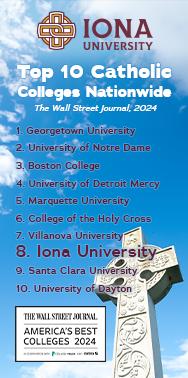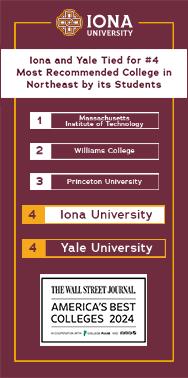Brendan Gill Lecture Reveals Kennedy’s Moxie, American Can-Do Spirit, and Billions that Launched First Man on the Moon

By Ellen de Saint Phalle, Member, Board of Trustees, The Bronxville Historical Conservancy
Jun. 19, 2019: Presidential historian and award-winning author Douglas Brinkley presented The Bronxville Historical Conservancy’s 21st annual Brendan Gill Lecture on June 7 in the Bronxville High School auditorium. Brinkley captivated the crowd with stories from his new book, American Moonshot: John F. Kennedy and the Great Space Race. Published in April by Harper in time for the 50th anniversary of the first lunar landing, Brinkley’s book is a New York Times bestseller with critics proclaiming the book an “exciting narrative, “compelling and comprehensive.” Brinkley’s presentation to a packed house confirmed his talents for scholarship and storytelling.
Bronxville Historical Conservancy co-chair Bill Zambelli welcomed the crowd, thanking his co-chair, Judy Foley, and board members Lisa Rao, Erin Saluti, Lorraine Shanley, and Lyndal Vermette for their efforts in planning the program. He thanked Bronxville Superintendent Roy R. Montesano and the Bronxville school board for the use of the auditorium and noted that the Bronxville School was awarded the Conservancy’s 2018 preservation award for its recent historic preservation of the high school auditorium. He also recognized the school’s National History Day students, who recently participated in the state competition, as well as one team that will be attending the national contest in Washington. Zambelli then welcomed Marilynn Hill, Brendan Gill Committee chair and Conservancy lifetime co-chair, to the podium to introduce Brinkley. Hill highlighted Brinkley’s many accomplishments, including 23 published books, seven honorary doctorates, and a Grammy award. She lauded his skill as “a master storyteller, delving into his subjects in a very personal and human way.”

Audience at the lecture in the Bronxville auditorium. Photo courtesy The Bronxville Historical Conservancy.
Thanking Hill for her “most thoughtful and thorough” introduction, Brinkley immediately engaged the audience in a very personal and human way. “Everybody of a certain age remembers where they were when the first human beings broke the shackles of earth and went on another celestial body,” he said. The event was indelibly seared in his mind as a young boy growing up in Ohio 80 miles from where one of his boyhood heroes, Neil Armstrong, lived.
“Don’t be afraid to be ambitious, Brinkley advised the young people in the audience. As an aspiring writer doing research, Brinkley came across Armstrong’s address and FedExed his first two books to him with a note requesting an interview. “I received a very polite blow-off,” Brinkley admitted. He shared that Armstrong thanked him for the books and said he would read one of them but did not do interviews. However, six or seven years later, much to Brinkley’s surprise, he received a letter from George Abbey at NASA headquarters informing him that Armstrong was turning 70 and was ready for an interview with Brinkley.
Perhaps Brinkley’s ambitious nature found a simpatico subject in John F. Kennedy. Explaining to the audience the why of the great space race and what motivated the nation to put a man on the moon, Brinkley’s answer was simple: “Kennedy liked to win.” Raised by a father who did not want to hear about second or third place, Kennedy grew up wanting to win at all costs. He never lost an election. When Kennedy made the bold assertion on May 25, 1961, to Congress that the United States would send a man to the moon and bring him back alive in the next decade and repeated it in September of 1962 at Rice University (where Brinkley currently serves as the Katherine Tsanoff Brown Chair in Humanities and professor of history), he was determined to win the space race with the Soviet Union.
In addition to President Kennedy, Brinkley elaborated on the other significant players leading up to the first lunar landing, including Eisenhower, Johnson, Nixon, and Soviet Premier Khrushchev; American physicist and rocket pioneer Robert Goddard; German-American rocket pioneer Wernher von Braun; NASA administrator James Webb; American astronauts John Glenn, Gus Grissom, Alan Shepard, Buzz Aldrin, and Neil Armstrong; and Soviet astronaut Yuri Gagarin. With each individual, Brinkley inserted anecdotes that added color and personality to the history.
Kennedy’s Moonshot – a term Brinkley explained was coined from a baseball announcer and became synonymous with the American can-do spirit – had economic and political implications. The resources that went into the space mission, $25 billion dollars, the equivalent of $180 billion today, fueled the economy in the South where Kennedy wanted to secure votes for reelection in 1964. George H. W. Bush, head of the Republican Party for Harris County in the Houston area at that time, said, “All Republicans should cheer John F. Kennedy’s visit for all the money he’s brought to our town through the space program.” Brinkley pointed out that the Moonshot resulted in spin-off technology and medical advances, including CAT scan, MRIs, kidney dialysis, and heart defibrillators, as well as telecommunications and satellite technology.
In spite of Kennedy’s assassination and the tragic death of three astronauts on a test mission in 1967, the United States continued Kennedy’s pledge. On July 20, 1969, commander Neil Armstrong and lunar module pilot Buzz Aldrin landed Apollo 11 on the moon.
Brinkley entertained questions from the audience, including a query on whether von Braun’s role as a Nazi officer should negate his success as a physicist and rocket pioneer for NASA. Brinkley covers the subject extensively in his book and concluded, “von Braun is not a sustainable hero. John Glenn, Neil Armstrong—they are sustainable heroes.”
Brinkley closed the Q & A by thanking the audience, including his wife, Anne, and daughter, Benton, who had accompanied him for the event. The audience then joined Brinkley for a reception and conversation in the foyer.
Named for the late Brendan Gill, a former Bronxville resident, critic, and writer for the New Yorker, the lecture is presented each year by The Bronxville Historical Conservancy as a gift to the community.
Pictured at top: David Brinkley.
Photo by David Snyder

Adult Education Directory
About the Bronxville Adult School & Contacts
The Bronxville Adult School is a not-for-profit organization incorporated in 1957 and chartered by the New York State Board of Regents. The School "offers all adults of Bronxville and surrounding communities the opportunity for personal growth through life enhancing skills and provides cultural, intellectual and recreational stimulation at a nominal cost."
The Bronxville Adult School
(914) 793-4435
email: This email address is being protected from spambots. You need JavaScript enabled to view it.
www.bronxvilleadultschool.org
Bronxville Public Library
The Bronxville Public Library traces its origins back to 1875, when it was a small lending library housed in a room attached to the “Bronxville Model School.” The Library was officially chartered in 1906 and moved into the Village Hall Building. The needs of the library grew with the town and, in 1942, a new standalone building was erected, which is where the Library is today. Over the years, the Library was renovated and expanded to meet the needs of the community.
The Library has wonderful resources for adults and children and offers a comfortable and relaxing environment. The Library also houses a fine art collection, consisting principally of Bronxville painters and sculptors.
The Library offers special events, art exhibitions, and programs for adults, young adults and children. All events are open to the public, unless otherwise indicated.
The Bronxville Public Library
914-337-7680
201 Pondfield Road (Midland Avenue & Pondfield Road)
http://bronxvillelibrary.org/
Iona University
At Iona, you’ll find bright, curious students eager to achieve for themselves, and for others. We foster both innovative, independent thinking and a deep commitment to community.
Iona’s unique locations offer the best of both worlds. Our New Rochelle and Bronxville campuses provide comfortable, intimate learning environments. At Iona, everyone knows everyone and faculty members and students work closely together.
With New York City less than half an hour away, students have unlimited options for career development and internship opportunities. Not to mention, access to some of the best cultural attractions in the world!
No two Iona journeys are alike. But they all have a few things in common. High-quality academics, outside-the-box thinking and dedication to helping others underscore every Iona experience.
Sarah Lawrence College
Sarah Lawrence is a prestigious, residential, coeducational liberal arts college. Founded in 1926 and consistently ranked among the leading liberal arts colleges in the country,
Sarah Lawrence is known for its pioneering approach to education, rich history of impassioned intellectual and civic engagement, and vibrant, successful alumni. In close proximity to the unparalleled offerings of New York City, our historic campus is home to an inclusive, intellectually curious, and diverse community.
914-337-0700
1 Mead Way
Bronxville, New York 10708

















